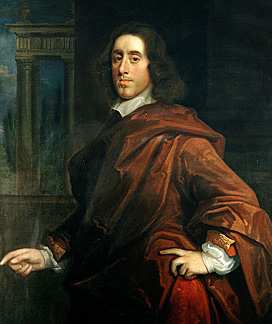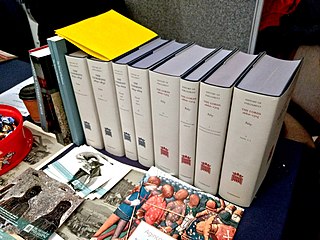Related Research Articles

The Restoration of the Stuart monarchy in the kingdoms of England, Scotland and Ireland took place in 1660 when King Charles II returned from exile in continental Europe. The preceding period of the Protectorate and the civil wars came to be known as the Interregnum (1649–1660).

Thomas Fuller was an English churchman and historian. He is now remembered for his writings, particularly his Worthies of England, published in 1662, after his death. He was a prolific author, and one of the first English writers able to live by his pen.

Sir Henry Vane, often referred to as Harry Vane and Henry Vane the Younger to distinguish him from his father, Henry Vane the Elder, was an English politician, statesman, and colonial governor. He was briefly present in North America, serving one term as the governor of the Massachusetts Bay Colony, and supported the creation of Roger Williams' Rhode Island Colony and Harvard College. A proponent of religious tolerance, as governor, he defended Anne Hutchinson and her right to teach religious topics in her home which put him in direct conflict with the Puritan leaders in the Massachusetts Colony. He returned to England after losing re-election and eventually, Hutchinson was banned from the colony.
This article contains information about the literary events and publications of 1629.

John Somers, 1st Baron Somers, was an English jurist, Whig statesman and peer. Somers first came to national attention in the trial of the Seven Bishops where he was on their defence counsel. He published tracts on political topics such as the succession to the crown, where he elaborated his Whig principles in support of the Exclusionists. He played a leading part in shaping the Revolution settlement. He was Lord High Chancellor of England under King William III and was a chief architect of the union between England and Scotland achieved in 1707 and the Protestant succession achieved in 1714. He was a leading Whig during the twenty-five years after 1688; with four colleagues he formed the Whig Junto.
Roger Boyle, 1st Earl of Orrery, styled Lord Broghill from 1628 to 1660, was an Anglo-Irish soldier and politician who sat in the House of Commons of England at various times between 1654 and 1679. Boyle fought in the Irish Confederate Wars and subsequently became known for his antagonism towards Irish Catholics and their political aspirations. He was also a noted playwright and writer on 17th-century warfare.
Thomas Rymer was an English poet, critic, antiquary and historian. His lasting contribution was to compile and publish 16 volumes of the first edition of Foedera, a work in 20 volumes conveying agreements between The Crown of England and foreign powers since 1101. He held the office of English Historiographer Royal from 1692 to 1714. He is credited with coining the phrase "poetic justice" in The Tragedies of the Last Age Consider'd (1678).

Edmund Ludlow was an English parliamentarian, best known for his involvement in the execution of Charles I, and for his Memoirs, which were published posthumously in a rewritten form and which have become a major source for historians of the Wars of the Three Kingdoms. Ludlow was elected a Member of the Long Parliament and served in the Parliamentary armies during the English Civil Wars. After the establishment of the Commonwealth in 1649 he was made second-in-command of Parliament's forces in Ireland, before breaking with Oliver Cromwell over the establishment of the Protectorate. After the Restoration Ludlow went into exile in Switzerland, where he spent much of the rest of his life. Ludlow himself spelt his name Ludlowe.

Sir Roger L'Estrange was an English pamphleteer, author, courtier, and press censor. Throughout his life L'Estrange was frequently mired in controversy and acted as a staunch ideological defender of King Charles II's regime during the Restoration era. His works played a key role in the emergence of a distinct 'Tory' bloc during the Exclusion Crisis of 1679-81. Perhaps his best known polemical pamphlet was An Account of the Growth of Knavery, which ruthlessly attacked the parliamentary opposition to Charles II and his successor James, Duke of York, placing them as fanatics who misused contemporary popular anti-Catholic sentiment to attack the Restoration court and the existing social order in order to pursue their own political ends. Following the Exclusion Crisis and the failure of the nascent Whig faction to disinherit James, Duke of York in favour of Charles II's illegitimate son James, 1st Duke of Monmouth L'Estrange used his newspaper The Observator to harangue his opponents and act as a voice for a popular provincial Toryism during the 'Tory Reaction' of 1681-85. Despite serving as an MP from 1685-89 his stock fell under James II's reign as his staunch hostility to religious nonconformism conflicted with James' goals of religious tolerance for both Catholics and Nonconformists. The Glorious Revolution of 1688 and the collapse of the Restoration political order heralded the end of L'Estrange's career in public life, although his greatest translation work, that of Aesop's Fables, saw publication in 1692.

Gilbert Mabbot, alternately Mabbott, was the official licenser of the press from 1647 to 1649 and himself a pioneering journalist and publisher of newsbooks during the English Civil War period.

Hugh Peter was an English preacher, political advisor and soldier who supported the Parliamentary cause during the English Civil War, and became highly influential. He employed a flamboyant preaching style that was considered highly effective in furthering the interests of the Puritan cause.
Thomas Willoughby, 1st Baron Middleton, was a Tory politician who sat in the English and British House of Commons between 1698 and 1711 when he was raised to the peerage as Baron Middleton as one of Harley's Dozen.
Nathaniel Butter was a London publisher of the early 17th century. As the publisher of the first edition of Shakespeare's King Lear in 1608, he has also been regarded as one of the first publishers of a newspaper in English.

Henry Scobell was an English Parliamentary official, and editor of official publications. He was clerk to the Long Parliament, and wrote on parliamentary procedure and precedents.

Sir George Wharton, 1st Baronet was an English military officer, astrologer and poet who served as Treasurer of the Ordnance from 1670 to 1681.

Simeon Ashe or Ash was an English nonconformist clergyman, a member of the Westminster Assembly and chaplain to the Parliamentary leader Edward Montagu, 2nd Earl of Manchester.

The History of Parliament is a project to write a complete history of the United Kingdom Parliament and its predecessors, the Parliament of Great Britain and the Parliament of England. The history will principally consist of a prosopography, in which the history of an institution is told through the individual biographies of its members. After various amateur efforts the project was formally launched in 1940 and since 1951 has been funded by the Treasury. As of 2019, the volumes covering the House of Commons for the periods 1386–1421, 1509–1629, and 1660–1832 have been completed and published ; and the first five volumes covering the House of Lords from 1660-1715 have been published, with further work on the Commons and the Lords ongoing. In 2011 the completed sections were republished on the internet.
Henry Mildmay was an English politician who sat in the House of Commons at various times between 1654 and 1692. He fought in the Parliamentary army in the English Civil War.
The history of journalism in the United Kingdom includes the gathering and transmitting of news, spans the growth of technology and trade, marked by the advent of specialised techniques for gathering and disseminating information on a regular basis. In the analysis of historians, it involves the steady increase of the scope of news available to us and the speed with which it is transmitted.
Elizabeth Alkin was a publisher, nurse and spy for the Parliamentarian forces during the English Civil War. Among the many derogatory names she was called by royalist sympathisers, that of Parliament Joan is one by which she is also commonly known.
References
- ↑ "Muddiman, Henry (MDMN647H)". A Cambridge Alumni Database. University of Cambridge.